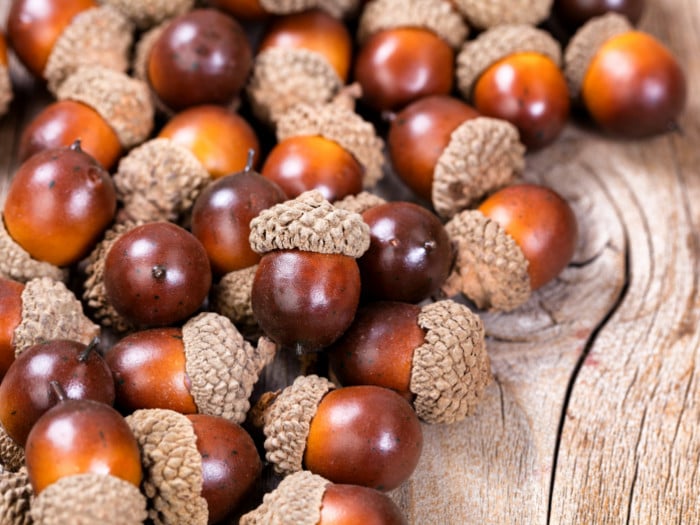Acorns have an impressive number of health benefits, which may include their ability to protect the heart, boost energy, improve digestion, and regulate blood sugar levels. These nuts also help in building strong bones, growth and repair, soothing inflammation, eliminating diarrhea, and skincare.
What are Acorn Nuts?
Acorns, also known as oak nuts, are nuts of the oak tree or one of their common relatives in the Quercus or Lithocarpus genera. They generally contain a single nut in a hard outer shell, topped by a cupule, which is where the nut attaches to the oak branch. Acorn nuts are 1 to 6 cm long and 0.8 to 4 cm broad, and they take 6 – 24 months to completely mature. You can find these nuts falling from oak trees across the Northern hemisphere or perhaps being gathered by squirrels for their winter food hoard. [1]
Acorn nuts used to be an important dietary staple in many early cultures, as they were widely available and served many of the same dietary needs as grains do today. In fact, acorns are still used in some cultures in specialty dishes, most notably by Korean and Native Americans. [2]
Can You Eat Acorns?
Yes, you can eat raw acorns, but they are bitter in taste and are tough to metabolize because of the tannins in them. You can boil or soak the nuts in water until they stop turning the water brown, which would help in making the acorns eatable. The presence of tannins in these nuts can cause irritation in the stomach lining and also affect your digestive process.

Acorns are a great source of fiber. Photo Credit: Shutterstock
| Serving Size : | |
|---|---|
| Nutrient | Value |
| Water [g] | 5.06 |
| Energy | 509 |
| Energy [kJ] | 2130 |
| Protein [g] | 8.1 |
| Total lipid (fat) [g] | 31.41 |
| Ash [g] | 1.78 |
| Carbohydrate, by difference [g] | 53.66 |
| Calcium, Ca [mg] | 54 |
| Iron, Fe [mg] | 1.04 |
| Magnesium, Mg [mg] | 82 |
| Phosphorus, P [mg] | 103 |
| Potassium, K [mg] | 709 |
| Zinc, Zn [mg] | 0.67 |
| Copper, Cu [mg] | 0.82 |
| Manganese, Mn [mg] | 1.36 |
| Thiamin [mg] | 0.15 |
| Riboflavin [mg] | 0.15 |
| Niacin [mg] | 2.41 |
| Pantothenic acid [mg] | 0.94 |
| Vitamin B-6 [mg] | 0.7 |
| Folate, total [µg] | 115 |
| Folate, food [µg] | 115 |
| Folate, DFE [µg] | 115 |
| Fatty acids, total saturated [g] | 4.08 |
| 16:0 [g] | 3.75 |
| 18:0 [g] | 0.33 |
| Fatty acids, total monounsaturated [g] | 19.9 |
| 18:1 [g] | 19.9 |
| Fatty acids, total polyunsaturated [g] | 6.05 |
| 18:2 [g] | 6.05 |
| Tryptophan [g] | 0.1 |
| Threonine [g] | 0.31 |
| Isoleucine [g] | 0.38 |
| Leucine [g] | 0.64 |
| Lysine [g] | 0.51 |
| Methionine [g] | 0.14 |
| Cystine [g] | 0.14 |
| Phenylalanine [g] | 0.35 |
| Tyrosine [g] | 0.25 |
| Valine [g] | 0.46 |
| Arginine [g] | 0.62 |
| Histidine [g] | 0.22 |
| Alanine [g] | 0.46 |
| Aspartic acid [g] | 0.84 |
| Glutamic acid [g] | 1.3 |
| Glycine [g] | 0.38 |
| Proline [g] | 0.32 |
| Serine [g] | 0.34 |
| Sources include : USDA [3] | |
Acorn Nuts Nutrition Facts
Acorns are consumed due to their various nutrients. They contain carbohydrates, fats, and proteins. The vitamin wealth in these nuts contains vitamin B1 (thiamine), vitamin B2 (riboflavin), vitamin B3 (niacin), vitamin B5 (pantothenic acid), vitamin B6, and vitamin B9 (folate). Minerals like calcium, copper, magnesium, manganese, iron, potassium, and zinc are also found in these nuts. [4]
Health Benefits of Acorns
Let’s take a closer look at the unexpected health benefits of acorns.
May Aid in Skin Care
There are a number of ways in which acorns are used to protect the skin, which may include operating as a possible astringent agent. After you soak or boil the nuts in water, the rich tannin water can be topically applied to the skin in order to soothe burns and rashes, speed up the healing of cuts and wounds, and reduce inflammation or burns. This application of nutrient-rich water can also be used to topically treat aches and pains. [5]
May Help Improve Digestion
Like most nuts, acorns have a significant amount of fiber, which may make them ideal for improving your digestive health. Fiber helps regulate bowel movements and eliminate both, constipation and diarrhea. This is ideal for people suffering from irregular bowel movements, cramping, bloating, and other gastrointestinal issues. [6]
May Help Prevent Diabetes
One of the most important benefits of acorns is their ability to regulate blood sugar levels in the body, thus preventing hazards that can lead to diabetes. A study by the Journal of Ethnopharmacology showed that the acorn seed extract had various healing effects on complications caused by diabetes. The fiber content and complex carbohydrates found in these nuts are the reason for this benefit. [7] [8]
May Help Protect Heart Health
Acorns can be a good alternative for people wanting to cut down on their overall fat content. These nuts have five times more unsaturated fats as compared to saturated fats, which can ideally improve your overall cholesterol balance and prevent obesity, atherosclerosis, and other dangerous conditions that threaten heart health. [9]
May Help Boost Energy Levels
The high level of complex carbohydrates, found in acorns, provides long-lasting energy reserves when consumed. You can substitute your regular flour with acorn flour or include nuts in your diet. Acorn coffee is also a healthier alternative than empty carbohydrates or simple sugars in instant energy drinks, which only provide short bursts of energy. [10]
May Help Keep Bones Healthy
The impressive mix of minerals found in acorns, which includes phosphorus, potassium, and calcium, helps boost bone health and prevent the onset of osteoporosis. Calcium is one of the most important minerals for bone mineral density and is found in high concentrations within an acorn. [11]
May Improve Metabolism
Oak nuts are packed with B vitamins, including niacin, thiamine, and riboflavin, which are very important for regulating metabolism. Regular consumption of these nuts can help regulate a number of enzymatic processes in the body that are crucial for overall health. [12]
May Help Promote Healing
Acorns are a rich source of proteins, which are key components of a healthy lifestyle. They are very important for the creation of new tissues and cells, repair damaged areas, and rapid healing following an injury or illness. Therefore, including acorn nuts in your diet helps with accelerated growth and repair. [13]
How to Make Acorn Coffee?
The most nutritious way of consuming acorns is in the form of coffee. Make one for yourself by following these simple recipes.

Acorn Coffee Recipe
Ingredients
- acorns
- water filtered
Instructions
- Boil the acorns for 20 mins approx.
- After cooling them, remove the outer shell and cut or process them till you get small pieces.
- Roast the pieces for 35-40 mins at 400 F, till they become dark brown in color while stirring them occasionally.
- Process the roasted acorns or use a coffee grinder for the same.
- Your acorn coffee powder is ready. Use 1 tbsp for every 6 oz of water for the best taste. Enjoy!

How to Eat Acorns?
- Acorns have been used more recently as a replacement for coffee, where the bitterness wasn’t as undesirable.
- Acorns can be ground into flour and baked into bread, muffins, and any other food where grain flour is typically used.
- Acorn starch or flour is used to make noodles in Korea.
- Roasted acorns are powdered and are used as a thickening agent in stews and curries.
Side Effects of Acorns
These oak nuts are a very healthy addition to your diet but can cause many side effects if consumed in excess. The major effects are mentioned below:
- Minor effects: Excessive consumption of these nuts can cause nausea and stomach upset due to the tannin content, so always ensure that you steep the acorns to remove those bitter components.
- Acorn Poisoning: Acorn poisoning or oak toxicity occurs when these nuts are consumed in excess. This may lead to gastrointestinal and kidney issues.
Fun fact: An average mature tree produces about 2200 acorns a year!

